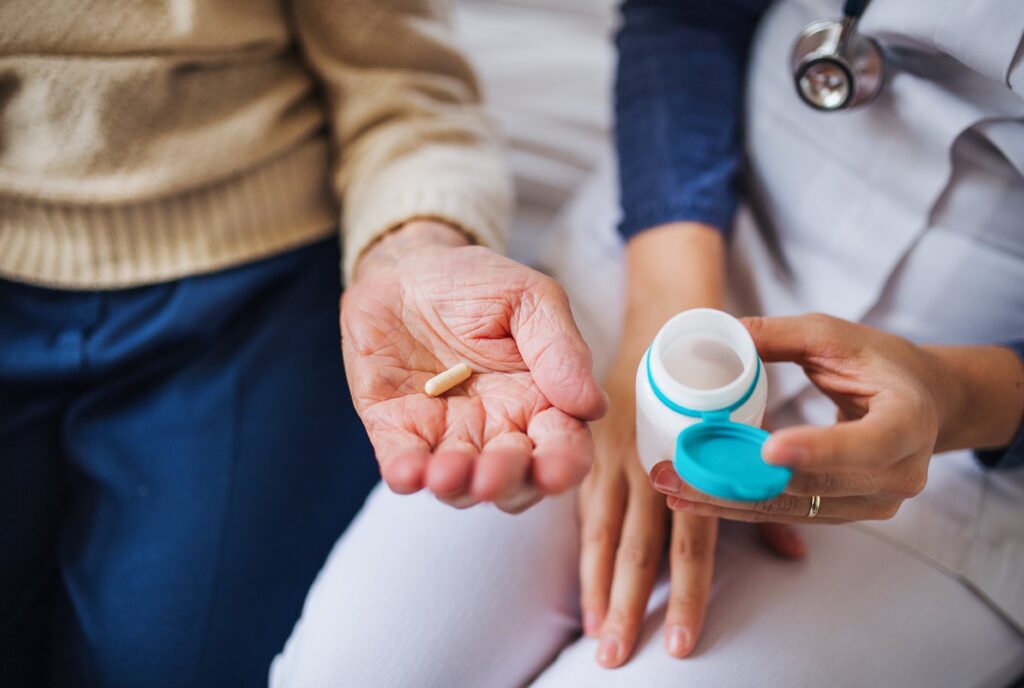Importance of Medication Management for Seniors
As people age, maintaining good health often means managing several prescriptions at once. In fact, nearly 40% of older adults take five or more medications daily, a situation known as polypharmacy.
While medications play a vital role in controlling chronic conditions like diabetes, hypertension, and arthritis, the complexity of juggling multiple prescriptions can increase the risk of errors, side effects, and hospital visits.
Medication management for seniors is more than keeping track of pills—it’s about safeguarding independence, reducing preventable complications, and improving quality of life.
Without a structured approach, elderly patients may face challenges such as:
- Mixing up prescriptions due to look-alike packaging.
- Forgetting doses because of memory loss or confusion.
- Experiencing harmful drug interactions when combining treatments for chronic diseases.
For families, the stakes are high. The National Institutes of Health shows that medication-related issues are among the top causes of preventable hospitalizations in older adults. This is why caregivers, healthcare providers, and seniors themselves all need practical strategies for safe medication use.
If you or a loved one is navigating multiple prescriptions, HealthyU offers primary care services across Arizona and California to support safe and effective treatment plans.
Table of Contents
The Basics of Medication Management for Seniors
What is Medication Management?
Medication management is the coordinated process of prescribing, monitoring, and reviewing medications to ensure they’re taken correctly and effectively. For seniors, this means more than just swallowing pills on time.
It involves:
- Keeping an updated list of prescriptions, supplements, and over-the-counter drugs.
- Ensuring proper dosage and timing.
- Monitoring for side effects or interactions.
- Regularly reviewing prescriptions with a healthcare provider.
A clear and consistent medication regimen reduces the risk of medication errors in the elderly and supports healthier outcomes. With effective medication management, you can lower hospital readmissions and improve daily functioning for older adults.
At HealthyU, providers often recommend scheduling periodic medication reviews to evaluate whether each prescription is still appropriate and safe.
Why Medication Management is Crucial for Seniors
Aging bodies process drugs differently. Declining kidney function, changes in metabolism, and reduced muscle mass all affect how seniors respond to medications. This means that even standard doses can sometimes trigger unexpected side effects in elderly patients.
Medication management is especially critical in the context of chronic disease management for elderly patients. Conditions like heart disease, COPD, and diabetes often require multiple prescriptions taken at precise intervals.
Without proper oversight, seniors may face:
- Drug interactions: Combining blood pressure medication with certain painkillers can cause dizziness or fainting.
- Side effects: Sedatives or sleep aids may increase the risk of falls.
- Non-adherence: Skipping doses of insulin or blood thinners can lead to serious complications.
By prioritizing seniors’ medication safety, families can help reduce these risks and ensure medications remain tools for health—not hazards.
Telehealth consultations through HealthyU’s clinics also provide convenient ways to stay on top of prescriptions without unnecessary travel.
Challenges in Medication Management for Seniors
Common Challenges Seniors Face
Even with the best intentions, seniors often run into obstacles that make safe medication use more difficult. Some of the most common barriers include:
- Cognitive decline: Conditions like dementia or memory loss can cause missed or double doses.
- Vision changes: Small-print labels or look-alike pill bottles make it easy to confuse medications.
- Physical limitations: Arthritis, tremors, or reduced grip strength can make opening bottles or splitting tablets challenging.
- Polypharmacy: Managing multiple prescriptions, sometimes from different specialists, increases the risk of elderly medication errors and dangerous interactions.
Families can help by simplifying regimens, using pill organizers, and working closely with healthcare providers. At HealthyU’s primary care clinics, providers often work closely with specialists to coordinate treatment plans and minimize the use of unnecessary medications.
Impact of Chronic Diseases
Chronic diseases are among the leading reasons seniors rely on multiple prescriptions. According to the National Council on Aging, nearly 80% of older adults live with at least one chronic condition, and 77% have two or more.
For seniors with diabetes, hypertension, or heart disease, missing or mismanaging medications can quickly spiral into severe complications. For example:
- A missed insulin dose can cause dangerous spikes in blood sugar.
- Skipping blood pressure medicine may increase stroke risk.
- Not taking blood thinners properly may raise the chance of blood clots.
This is why chronic disease management in the elderly must always include careful medication monitoring and oversight. Families should ask about medication reviews and chronic disease management support at HealthyU clinics in Arizona and California.
Medication Safety Tips for Seniors
Tip #1: Keep an Updated List of Medications
An up-to-date list of prescriptions, over-the-counter medicines, and supplements helps avoid duplication and interactions. The Health in Aging Foundation recommends keeping both paper and digital copies that can be shared with all providers.
Tip #2: Set Up a Medication Schedule
Consistency is key to medication adherence in older adults. Seniors should set alarms, use color-coded pillboxes, or try reminder apps to stay on track. Caregivers can also assist by creating calendars or charts that mark daily doses.
Tip #3: Understand Your Medications
Seniors should know what each medication is for, how it works, and its possible side effects. This knowledge empowers them to notice if something feels off. FDA’s safety tips suggest bringing a list of questions to every doctor’s appointment.
Tip #4: Medication Reviews
Regular reviews with healthcare providers ensure prescriptions are still necessary, dosages remain safe, and interactions are minimized. This practice can reduce polypharmacy in elderly patients and promote safer regimens. You can schedule a medication review through HealthyU.
Tip #5: Watch for Side Effects
Common medication side effects in seniors include dizziness, fatigue, confusion, and digestive issues. Families should track new symptoms and report them promptly. According to the Mayo Clinic Health System, side effects are one of the top causes of emergency visits among older adults.
Senior Medication Challenges vs. Solutions
| Challenge | Potential Solution |
|---|---|
| Forgetting doses | Use alarms, apps, or caregiver reminders |
| Hard-to-open bottles | Ask pharmacy for easy-open lids or blister packs |
| Too many prescriptions (polypharmacy) | equest a medication review to streamline regimens |
| Vision impairments | Use large-print labels, magnifiers, or color coding |
| Confusion about the purpose of meds | Ask providers to explain in plain language |
Technology and Tools to Assist in Medication Management
Medication Management Apps
Smartphone and tablet apps are becoming valuable tools for managing medications in older adults. These apps allow seniors or caregivers to:
- Schedule reminders for daily doses
- Track adherence and missed medications
- Store updated lists of prescriptions and allergies
- Refill prescriptions directly through connected pharmacies
Popular examples include Medisafe, CareZone, and Pill Reminder. A study in the Journal of Clinical Medicine found that seniors who used reminder apps had significantly higher medication adherence rates compared to those relying on memory alone.
Smart Pill Bottles & Dispensers
Innovative devices such as smart pill bottles and dispensers take reminders a step further. These technologies can:
- Track when a bottle is opened
- Send alerts to a smartphone if a dose is missed
- Provide visual or auditory cues for seniors with sensory limitations
- Notify caregivers remotely about skipped doses
These tools help reduce polypharmacy-related risks in elderly patients, particularly those juggling multiple prescriptions. For families, it means peace of mind knowing there’s an extra layer of oversight.
Telehealth and Remote Monitoring
Telehealth services now allow seniors to connect with healthcare providers from the comfort of home.
Through video visits, providers can:
- Review prescriptions
- Check for possible drug interactions
- Adjust dosages without requiring an in-person visit
Remote monitoring systems can even track health indicators, such as blood pressure or glucose levels, and send real-time updates to providers. For patients managing chronic diseases, this combination of medication oversight and health tracking reduces emergency visits and keeps conditions under control.
The Role of Caregivers in Medication Management
Caregivers as Pill Partners
For many seniors, caregivers play a vital role in elderly medication management. Whether a spouse, adult child, or professional aide, caregivers often:
- Monitor daily medication use and organize pillboxes or smart dispensers.
- Encourage adherence by providing gentle reminders.
- Watch for warning signs such as dizziness, confusion, or sudden mood changes.
Caregivers must support senior independence while ensuring safety. It’s best to involve seniors in the process whenever possible, as it fosters dignity and cooperation.
HealthyU emphasizes collaboration between patients, caregivers, and providers. If you’re caring for a loved one, our providers can guide you in spotting red flags and setting up safer medication routines.
Communication with Healthcare Providers
Open communication with doctors and pharmacists is essential to avoid elderly medication errors.
Prior to a healthcare visit, caregivers should:
- Bring an updated medication list to every appointment.
- Ask about possible drug interactions, especially with new prescriptions.
- Advocate for simplifying regimens when possible.
- Request printed instructions in large font for seniors with vision challenges.
By acting as liaisons, caregivers ensure seniors receive clear guidance and that no crucial details are overlooked. Providers at HealthyU’s Arizona and California clinics encourage caregivers to attend visits and take part in shared decision-making.
Key Takeaways: Medication Management for Elderly Patients
Medication management for seniors sets the foundation for safe, independent living. With nearly four in five older adults managing at least one chronic illness, and many juggling multiple prescriptions, effective medication practices reduce risks, prevent hospitalizations, and improve quality of life.
Key takeaways from this guide include:
- Organize consistently: Updated lists, pill organizers, and digital tools make tracking easier.
- Review regularly: Medication reviews help reduce unnecessary prescriptions and prevent interactions.
- Empower seniors: Understanding what each medication does fosters independence and confidence.
- Use technology: Apps, smart pill bottles, and telehealth provide modern solutions for adherence.
- Involve caregivers: Family or professional caregivers can spot side effects and ensure safe use.
HealthyU Clinics provide comprehensive care for older adults, from chronic disease management to preventative screenings. Whether you’re in Arizona or California, our team can help you or your loved ones stay safe and healthy.
Learn more by visiting our Medicare Advantage services or connecting with a HealthyU provider for personalized guidance.
Book an Appointment with HealthyU for a Healthier You
Don’t wait for a medication-related issue to arise. Start today by scheduling a medication review appointment, setting up a pill organizer, or downloading a medication reminder app.
Frequently Asked Questions
What are the 5 R's of medication management?
The 5 R’s are a standard safety practice:
- Right patient
- Right drug
- Right dose
- Right route
- Right time
These steps reduce elderly medication errors and ensure safe administration.
What is a medication care plan for the elderly?
A care plan is a personalized document outlining all prescribed medications, their purpose, dosage, and timing. It may also include monitoring instructions for side effects. Seniors often create these plans with the help of providers at HealthyU primary care clinics.
What are the 5 stages of medication management?
The five stages typically include:
- Prescribing
- Transcribing/documentation
- Dispensing
- Administration
- Monitoring and review
Each stage plays a role in ensuring medication safety in older adults.
What does MAR stand for in medication?
MAR refers to the Medication Administration Record, a log used in hospitals, nursing homes, and caregiving settings to track when and how medications are administered.
What are common medication management challenges?
Challenges include polypharmacy, memory loss, visual impairments, and difficulty organizing prescriptions. Technology tools like smart pill bottles and apps, along with caregiver support, can help overcome these barriers.
How to improve medication safety in older adults?
Strategies include regular provider reviews, using pill organizers, leveraging reminder apps, and maintaining open communication between caregivers, seniors, and healthcare teams. Seniors and families can also use reliable resources such as the FDA’s medication safety tips for guidance.









